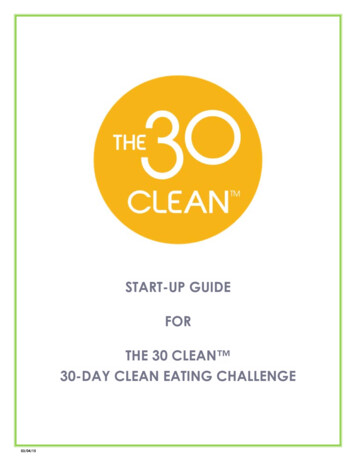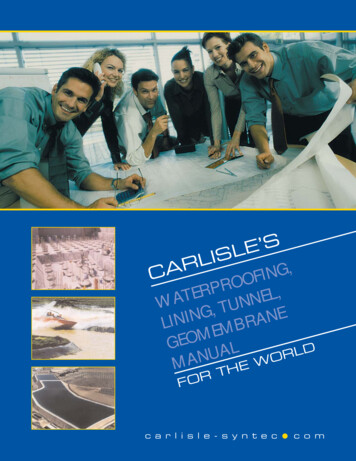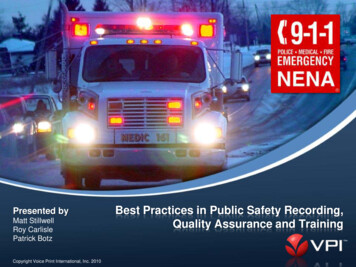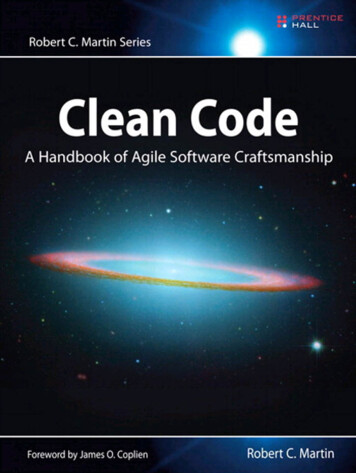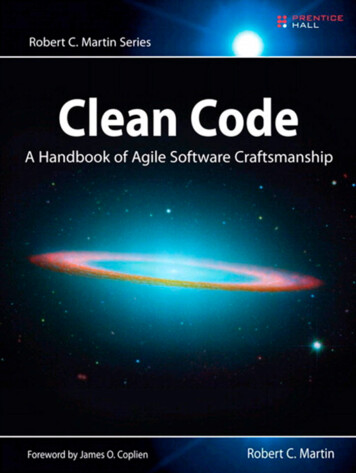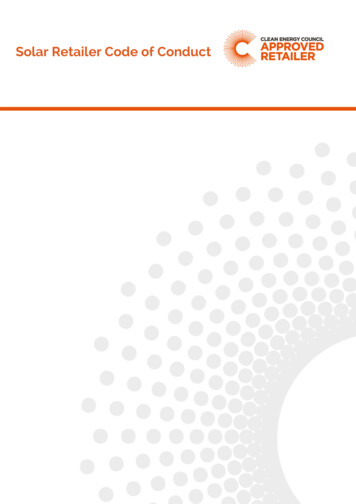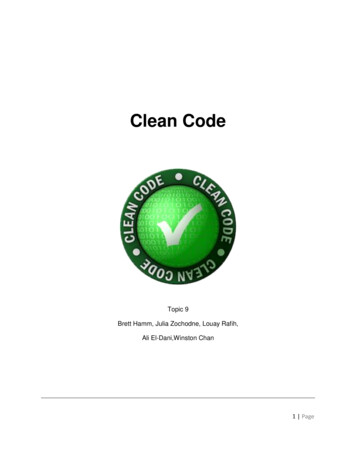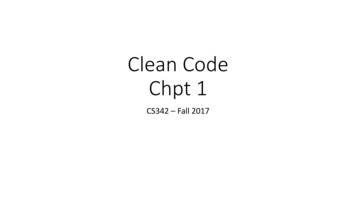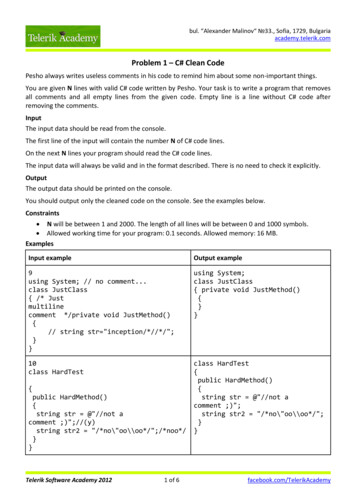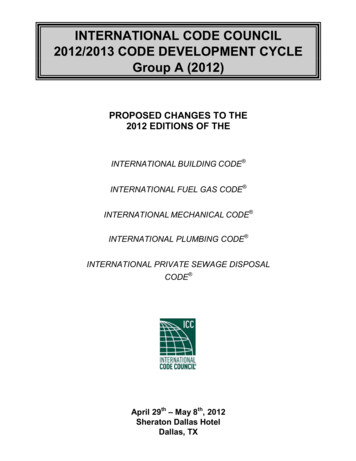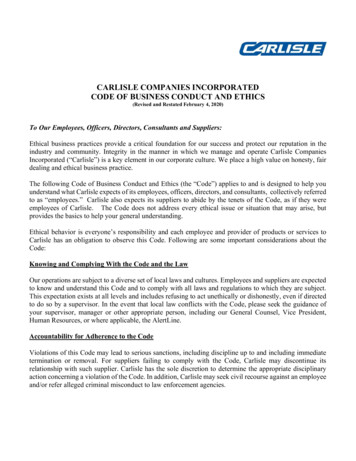
Transcription
CARLISLE COMPANIES INCORPORATEDCODE OF BUSINESS CONDUCT AND ETHICS(Revised and Restated February 4, 2020)To Our Employees, Officers, Directors, Consultants and Suppliers:Ethical business practices provide a critical foundation for our success and protect our reputation in theindustry and community. Integrity in the manner in which we manage and operate Carlisle CompaniesIncorporated (“Carlisle”) is a key element in our corporate culture. We place a high value on honesty, fairdealing and ethical business practice.The following Code of Business Conduct and Ethics (the “Code”) applies to and is designed to help youunderstand what Carlisle expects of its employees, officers, directors, and consultants, collectively referredto as “employees.” Carlisle also expects its suppliers to abide by the tenets of the Code, as if they wereemployees of Carlisle. The Code does not address every ethical issue or situation that may arise, butprovides the basics to help your general understanding.Ethical behavior is everyone’s responsibility and each employee and provider of products or services toCarlisle has an obligation to observe this Code. Following are some important considerations about theCode:Knowing and Complying With the Code and the LawOur operations are subject to a diverse set of local laws and cultures. Employees and suppliers are expectedto know and understand this Code and to comply with all laws and regulations to which they are subject.This expectation exists at all levels and includes refusing to act unethically or dishonestly, even if directedto do so by a supervisor. In the event that local law conflicts with the Code, please seek the guidance ofyour supervisor, manager or other appropriate person, including our General Counsel, Vice President,Human Resources, or where applicable, the AlertLine.Accountability for Adherence to the CodeViolations of this Code may lead to serious sanctions, including discipline up to and including immediatetermination or removal. For suppliers failing to comply with the Code, Carlisle may discontinue itsrelationship with such supplier. Carlisle has the sole discretion to determine the appropriate disciplinaryaction concerning a violation of the Code. In addition, Carlisle may seek civil recourse against an employeeand/or refer alleged criminal misconduct to law enforcement agencies.
The Open Door PolicyEveryone has the right and responsibility to ask questions about things that are unclear or raise concerns.Carlisle’s policy is to facilitate an open and respectful avenue of communication when such questions orconcerns arise. If a potential course of action seems questionable, everyone should feel comfortableapproaching their supervisor, manager or other appropriate person, including Carlisle’s General Counsel,Vice President, Human Resources or, where applicable, the AlertLine, at any time.Zero Tolerance for RetaliationIf you suspect wrongdoing—including violations of the Code, Carlisle policies, or the law—please reportit immediately. Retaliation against one who reports a good faith concern, consistent with our open doorpolicy, is absolutely prohibited. Good faith means your concern is honest and accurate (to the best of yourknowledge), regardless of whether that belief is found, at a later date, to be mistaken. Allegations made inbad faith or maliciously, however, may be subject to disciplinary action.Where You Can Report Your ConcernsTo maintain an ethical atmosphere, employees must speak up when they have questions or concerns.Because Carlisle wants to facilitate an atmosphere that encourages the open flow of communication,Carlisle offers a number of options for reporting. These options include: Your immediate supervisor or local HR representative. Carlisle’s Vice President, Human Resources – 480-781-5000 Carlisle’s General Counsel – 480-781-5000 AlertLine, for anonymous reporting of potential fraud - 1-800-294-2341OrganizationThis Code sets forth Carlisle’s basic policies and is organized as follows:Part A:Part B:Part C:Part D:Part E:Part F:Part G:Fundamental PrinciplesConfidential InformationConflicts of InterestBusiness ConductReporting Suspected Illegal or Unethical BehaviorPublic Disclosure of the CodeAdministration and Monitoring of the Code2
A.FUNDAMENTAL PRINCIPLES1.Honesty, Integrity and FairnessEthical business conduct should exist at a level well above the minimum required by law. Honestyis not subject to equivocation at any time and we must always choose the course of highest integrity.A fundamental principle of business success is to treat all persons fairly. Everyone, including ourcompetitors, customers, suppliers and employees, is entitled to expect that our conduct will reflectthe highest standards of honesty, integrity and fairness in all regards. When engaging the servicesof others, our choices should be made on the basis of the quality of the service and thecompetitiveness of the value. No employee should take unfair advantage of anyone throughmanipulation, concealment, abuse of privileged information, misrepresentation of material facts orany other unfair dealing practice. Our reputation is dependent upon exercising fairness, honesty andintegrity in all dealings and transactions. Appearances of misconduct or impropriety also must beavoided.2.Compliance with Laws and RegulationsThere are numerous laws and regulations, both domestic and foreign, which govern our operations.Laws and regulations of general applicability include equal employment, anti-trust, environmental,government procurement, unfair competition, insider trading prohibitions, the Foreign CorruptPractices Act and other foreign anti-bribery laws, anti-money laundering laws, and economicsanctions laws. We have the obligation, both individually and as a corporation, to comply not onlywith the letter of all applicable laws and regulations, but also the intent.Failure to comply with these laws and regulations can have serious consequences, including legalliability for damages and other penalties. Employees have the responsibility to learn and understandthe legal provisions applicable to the activities of their department and their particularresponsibilities within their departments, some of which are addressed in your employee handbook.Where unresolved legal questions are identified, or any uncertainties exist, they should be broughtto the attention of the appropriate supervisor or department head. If further assistance is required, orif reporting directly to the applicable supervisor or department head is impractical, Carlisle’sGeneral Counsel should be consulted.3.Non-DiscriminationCarlisle is committed to a policy of non-discriminatory treatment of all current and prospectiveemployees and is committed to diversity and inclusion in our workforce. We must always beobjective in dealing with others and in decision-making. Everyone we come in contact with must betreated fairly in all respects. Discrimination on the basis of an individual’s race, religion, creed,color, sex, sexual orientation, age, marital status, disability, national origin or veteran’s status is notpermitted by Carlisle and may is illegal in many jurisdictions. Local law may prohibitdiscrimination based on additional characteristics; you may confirm the status of protected classesin your jurisdiction with your HR representative. All employees must refrain from considering suchfactors in making business decisions.3
4.Human RightsIt is the policy of Carlisle that:Carlisle respects the human rights of all employees and strives to treat them with dignity consistentwith standards and practices recognized by the international community. Carlisle is committed to aworkplace free of harassment. No employee should be threatened with, nor subject to, inappropriatebehavior or practices, including sexual harassment, sexual abuse, mental or physical coercion,verbal abuse or unreasonable restrictions.Carlisle will not use any form of forced, bonded, indentured or prison labor, nor labor that is obtainedthrough mental or physical coercion, physical punishment, slavery, or other oppressive laborconditions and will not engage in any form of human trafficking. All work should be voluntary andall employees should be free to leave work or terminate their employment. Carlisle expects thirdparty labor agencies providing employees to be compliant with the provisions of this policy andapplicable laws and regulations.Carlisle will not employ child labor. The minimum age for employment for any employee will notbe below the minimum age set by the applicable jurisdiction. No person between the ages of 16 and18 should be employed unless such employment is in compliance with applicable health and safetylaws and regulations. Work weeks should not exceed the maximum set by law.Carlisle will pay all employees at least the minimum wage required by applicable laws and provideall legally mandated benefits, including compensation for overtime hours, where applicable, at thelegally-required rates. Employees should be paid in a timely manner, and the basis on whichemployees are being paid should be clearly conveyed to employees in a timely manner.Carlisle is committed to respecting all human rights, as articulated in the Universal Declaration ofHuman Rights, the International Covenant on Civil and Political Rights, the International Covenanton Economic, Social and Cultural Rights, and the International Labor Organization’s (ILO)Declaration on Fundamental Principles and Rights at Work. Carlisle will respect stakeholders’views in the continuing development, implementation and evaluation of this policy.Carlisle acknowledges the right of employees to associate freely, form and join employeeorganizations of their choosing, seek representation, and bargain collectively, as permitted by andin accordance with applicable laws. All employees should be able to openly present grievancesconcerning the work environment or management practices without fear of reprisal.Carlisle expects our business partners, including suppliers, to be compliant with the provisions ofthis policy and applicable laws and regulations and to adhere to the values expressed in this policy.Any employee with knowledge of any violation of this policy should report such violation to theemployee’s immediate supervisor or local HR representative or to Carlisle’s General Counsel orVice President, Human Resources.4
5.Occupational Health and SafetyCarlisle’s goal is to eliminate injuries to employees due to work-related accidents so that everyemployee is safe and secure working for Carlisle. However, even with this goal in mind, accidentswill happen and Carlisle will be vigilant in implementing sound health and safety managementpractices to manage risks and minimize work-related accidents. Carlisle also expects its suppliersto create safe working conditions and a healthy work environment for all of their employees.It is the policy of Carlisle that the company and its suppliers use best efforts to eliminate physicalhazards in the workplace and identify, evaluate and control employee exposure to hazardouschemicals and other physical agents. Employees must be provided appropriate personal protectiveequipment where required and must have the right to refuse unsafe working conditions without fearof reprisal until their concerns are adequately addressed.It is the policy of Carlisle that the company and its suppliers anticipate, identify and assessemergency situations and implement emergency plans and response procedures, includingemergency reporting, employee notification, employee training, provision of first-aid supplies, firedetection and suppression equipment, and recovery plans. Carlisle and its suppliers should alsohave procedures in place to manage, track and report occupational injury and illness as well asimplementing corrective measures to eliminate or minimize the likelihood of recurrence. Necessarymedical treatment and facilitation of employees’ return to work should also be provided.It is the policy of Carlisle that the company and its suppliers ensure that all employees receiveappropriate workplace health and safety information and training, including written health andsafety information and warnings and access to all safety data sheets for any chemicals used in theworkplace. Carlisle supports employee health and safety committees and encourages employeeinput regarding occupational health and safety in the workplace.6.Environmental StewardshipCarlisle recognizes that respect for the environment is crucial to future generations and is committedto conduct its operations in ways that minimize the impact on natural resources and protect theenvironment. Carlisle expects its suppliers to continue to improve its products and servicesconsistent with environmental stewardship.Carlisle is committed to waste minimization and recycling to reduce or eliminate waste, includingpreservation of water and energy. It is Carlisle’s policy that the company and its suppliers adhereto all laws, permits, and regulations related to air emissions, water discharges, toxic substances andhazardous waste disposal.B.CONFIDENTIAL INFORMATION1.Information About Carlisle Companies and Proprietary DataBecause of their positions or relationships, employees may obtain or become aware of informationabout Carlisle or its companies not otherwise available to the public. This information includes non-5
public information that might be of use to competitors, or harmful to Carlisle or its customers, ifdisclosed, including but is not limited to financial records, customer lists, current or formeremployees, price lists, marketing plans, product developments, specifications, intangible assets,formulas and manufacturing processes.Employees who have access to such information have a duty and obligation to protect this property.Business and confidential information concerning Carlisle or any of its companies should never bedisclosed until it has been published or disclosed to security holders or otherwise made generallyavailable to the public. In addition, this information should never be disclosed to individuals withinCarlisle unless such persons have a bona fide reason to know and are authorized to have access tosuch information.2.Information About CustomersDuring the regular conduct of business, employees may become aware of information aboutcustomers, suppliers or other parties that is confidential. This information must not be disclosed toanyone either inside or outside Carlisle who does not have a legitimate reason to know theinformation. Employees are also strictly prohibited from seeking or obtaining proprietary or otherinformation about customers, suppliers and other parties to which Carlisle is not legitimatelyentitled. Apart from routine credit or similar inquiries, no information concerning our customers’and suppliers’ affairs should be released to outsiders, including law enforcement authorities, exceptin response to a valid subpoena or similar legal process.3.Treatment of Confidential InformationParticular care must be exercised when confidential information must be communicated toindividuals in other departments or companies. These individuals may have conflicting obligationsor different responsibilities. Confidential information must not be misused and, where possible,confidential information should communicated in such a manner as not to disclose any portion ofthe confidential information which is not necessary.4.Insider InformationInsider trading is both unethical and illegal and Federal securities laws prohibit employees fromtaking advantage of material nonpublic information about Carlisle or our customers and suppliers.Communicating nonpublic information to others is also prohibited. Consistent with Federalsecurities laws, Carlisle’s policy prohibits all employees who have access to material non-publicinformation from buying or selling securities of Carlisle or engaging in any other action to takeadvantage of, or pass onto others, that information. This prohibition also applies to informationrelating to any other company, including our customers or suppliers, discovered in the course ofemployment with Carlisle.Material information is any information which would be important to a reasonable investor indetermining whether to buy, hold or sell stock. In other words, any information which couldreasonably affect the price of the stock. Examples of material information include: projections offuture earnings or losses; new products or discoveries; changes in dividend policies or the6
declaration of a stock split or the offering of additional shares; news of a pending or proposedmerger, acquisition or disposition; significant litigation or government investigation; and gain orloss of a substantial customer or supplier. Either positive or negative information may be material.After Carlisle has made a public announcement of material information, employees should continueto consider the information “non-public” until our shareholders and the investing public have hadtime to receive and assess the information. As a general rule, you should not engage in anytransaction in Company stock until at least one full business day after the information has beenreleased.In addition, Carlisle’s directors, Section 16 officers and certain other management personnel aresubject to restrictions limiting the timing of any trading in Carlisle stock.5.Trade Secrets of OthersCarlisle recognizes the legal protections afforded to the trade secrets and proprietary information ofothers, including but not limited to competitors, and prohibits its employees from engaging in illegalor otherwise improper acts to acquire or use such trade secrets and/or proprietary information.C.CONFLICTS OF INTEREST1.General PolicyA conflict of interest arises when an employee has a personal interest in a transaction, or anobligation they may owe to someone else, which comes into conflict, or appears to come intoconflict, with the employee’s obligation to Carlisle and its customers. Employees are prohibitedfrom having personal, business or financial interests that are, or appear to be, incompatible withtheir responsibility to Carlisle.Accordingly, employees are prohibited from participating in transactions or events in which theymay have an interest that could result or appear to result in divided loyalties. Conflict of interestrules apply to all transactions and events, whether direct, or indirect through an employee’s familyor associates.2.Misuse of Business and Personal RelationshipsWhile employees have personal lives and interests, these must be managed to avoid conflicts ofinterest and the appearance of any conflicts of interest. Conflicts of interest between personal andcompany responsibilities may arise in a variety of contexts and employees must always be alert forsuch conflicts.Employees are not allowed to maintain a position of control or influence, or maintain an investmentor financial interest in, a competitor, supplier or a customer where such relationship causes dividedloyalty or appearance of an impropriety between Carlisle and the employee. Employees are alsoprohibited from engaging in activities for personal gain or profit outside the scope of theiremployment when such activities conflict, or appear to conflict, with any interest of Carlisle. In7
addition, corporate assets cannot be used for the personal benefit or gain by employees or insituations that may conflict with the operations of the business.3.Gifts to or from Suppliers or CustomersEmployees or members of their families cannot accept money, gifts or anything of value fromcustomers, suppliers or anyone else with whom the employee maintains a relationship in his or heremployment. Employees also cannot give money, gifts, or anything of value to customers, suppliersor anyone else that may be perceived as done to gain a business advantage. The following arerecognized exceptions to the general prohibition against giving things of value to customers andother business associates, and seeking or accepting anything of value:(i)Promotional or advertising gifts (calendars, pens, etc.) routinely distributed by the donors oritems in connection with customarily recognized events (promotions, Christmas).(ii)Customary entertainment provided to or by Carlisle employees in the ordinary course ofbusiness and directly related to the active conduct of a sound and ethical businessrelationship. The value of any meals or entertainment provided should not exceed reasonableand customary amounts in a general business environment.(iii)Expense paid trips provided by, for, or on behalf of others with whom there is a Carlislebusiness relationship are prohibited without the approval of the President of the Carlislebusiness unit which employs the employee. Giving or receiving luxury vacations, first classaccommodations, or travel that includes the recipient’s family or other personal associateswill not be approved.(iv)Any exceptions to this policy must be approved beforehand by Carlisle’s General Counsel.4.Affiliations with Other OrganizationsEmployees are expected to devote their full attention and energies to company responsibilitiesduring regular working hours. Employees must insure that outside activities do not interfere withtheir duties at Carlisle, reflect adversely on Carlisle or present potential conflict of interest problems.Employees may not accept a position as a director, officer, partner or consultant of any businessorganized for profit without the written consent of Carlisle’s General Counsel. All employees havethe responsibility to notify their supervisor of any proposed outside employment. Any approval ofproposed outside employment must be in writing.5.Company OpportunitiesEmployees owe a duty to Carlisle to advance its legitimate interests when the opportunity to do soarises. Employees are prohibited from (i) taking for themselves personally, or for the benefit offriends or family members, opportunities that are discovered through the use of company property,information or their position; (ii) using Carlisle property, information or their position for personalgain; or (iii) competing with Carlisle directly or indirectly.8
6.Public ServiceThe holding of public office, elective or otherwise, may give rise to a conflict of interest which maybe illegal or which may prevent Carlisle from having normal business relationships with thegovernmental body involved. Specific approval in writing from Carlisle’s General Counsel mustbe obtained before an employee seeks a public office or accepts an appointment to one.D.BUSINESS CONDUCT1.General StatementsBusiness conduct guidelines have been established to assist each employee in pursuing a propercourse of conduct in carrying out his or her employment responsibilities and to call attention tocertain legal problems.The employment relationship carries with it a fiduciary duty, or a position of trust, to act at all timesin the best interest of Carlisle. Each employee under certain conditions may be considered an agentof Carlisle and as such could bind Carlisle to certain obligations or to incur certain legal liabilitiesas a result of actions or conduct taken. Failure to act properly and prudently as an agent of Carlislemay subject the employee or Carlisle, or both, to legal liability, as well as harm Carlisle’s businessreputation.Each employee is responsible for the propriety and consequences of his or her actions. No one willbe excused from misconduct directed or requested by someone else.2.Improper Payments and Anti-BriberyCarlisle policy absolutely prohibits improper payments or bribes of any kind to any persons ororganizations in order to secure a business advantage or to influence their policies or decisions, orfor any other reason whatsoever. Nor may employees offer or share any finders’ fees, specialrebates, allowances or discounts with customers, suppliers, or others that are improper orinconsistent with Carlisle’s plans or policies.Most, if not all of the countries where Carlisle does business have laws against corruption andbribery. One of these is the Foreign Corrupt Practices Act (“FCPA”). The FCPA was enacted toprohibit bribes and other illegal payments to officials of a foreign government, public internationalorganization or foreign political party by American companies and citizens, and by foreign personspresent in the United States, to obtain or retain business or to secure any improper businessadvantage. The FCPA contains provisions concerning record keeping and accounting as well aspenalties for bribery.The accounting provisions require Carlisle to keep detailed books, records and accounts accuratelyreflecting corporate payments and transactions. They also require companies to institute andmaintain internal accounting control systems that would assure management’s control over thecompany’s assets, and establish penalties against any person who falsifies a company’s books andrecords or circumvents a system of internal controls.9
The anti-bribery provisions prohibit corruptly making an offer, payment or promise to pay or giveanything of value to a foreign official to obtain or retain business or secure any improper businessadvantage. The anti-bribery provisions also prohibit making any indirect payment to a third partywith knowledge or reckless disregard for the fact that it will be used for purposes prohibited by thestatute.In addition to the FCPA, Carlisle is required to comply with other anti-corruption laws of the U.S.states and countries where it conducts business. Many of these laws contain additional prohibitionsand restrictions. Some of them make it illegal to bribe private (non-government) customers, vendorsor business partners, or to receive bribes in exchange for acting (or refraining to act) on behalf of acompany for whom an individual works. Others prohibit bribing U.S. federal, state or localgovernment officials.It is the policy of Carlisle to comply with the provisions of the FCPA as well as any other applicableanti-bribery or anti-corruption laws in the countries and states where it conducts business. Noemployee shall offer, promise, make, or facilitate the making of, payments to foreign officials thatare prohibited by the FCPA. Similarly, no employee shall participate in commercial bribery oraccept bribes in connection with business activity on behalf of Carlisle, or engage in bribery ofpublic officials in the U.S.Any employee who has knowledge of facts or incidents which he or she believes may be in violationof this policy has an obligation, promptly after learning of such fact or incident, to review the matterwith Carlisle’s General Counsel. Any employee who violates this policy, who orders another toviolate this policy, or who knowingly permits a subordinate to violate this policy, will be subject toappropriate disciplinary action.3.Political Activities and ContributionsCarlisle encourages and expects employees to take an active interest in the political process and beinformed with respect to governmental activities at all levels. However, Federal and state laws andregulations severely restrict corporations from making political contributions or conducting politicalactivities. As a matter of policy, Carlisle will not make political contributions, direct or indirect, toany political candidate or organization nor use Company funds for any other political advocacy,including lobbying or making contributions to tax-exempt political groups. Additionally, Carlislewill not permit employees to conduct political activities on company time or to use companyfacilities, equipment or supplies in carrying out such activities.4.Dealings with Public OfficialsWhile employees are encouraged to participate in community organizations and activities, includingdealing with public officials, all conduct should be at a standard to avoid compromising the integrityand reputation of the employee or Carlisle.10
5.Governmental InvestigationsFrom time to time, Carlisle may be subject to inquiries from federal, state or local governmentalagencies. All employees must cooperate fully with any agency making an investigation, and arestrictly prohibited from providing false or misleading information to government investigators.Responses to inquiries, however, must be coordinated by Carlisle’s General Counsel. If an employeereceives an inquiry from a governmental agency (other than for routine report filings as required bylaw) they should contact the division president immediately, who will in turn, advise the GeneralCounsel.6.Government ProcurementThe United States and state and local governments have laws and regulations governingprocurement applicable to direct and indirect sales of products and services. These laws involvedisclosure of cost and pricing data, product information, use of consultants and use of confidentialprocurement information. Employees must adhere to all of these laws and are urged to contact theGeneral Counsel regarding adherence to this policy.7.Anti-Money Laundering LawsCarlisle is committed to complying with all applicable anti-money laundering laws and regulations(collectively “AML Laws”). Carlisle is not a financial institution or money services business and assuch, certain aspects of U.S. AML Laws do not apply to its operations. Nevertheless, it is Carlisle’spolicy to comply with its obligations under U.S. AML Laws, specifically with risks associated withthird parties. Any Carlisle employees who suspect that any activities or arrangements that appearsuspicious or indicative of money laundering or other unlawful conduct should report immediatelyto Carlisle’s General Counsel. Employees may not inform any other party, including the third partyin question, regarding any such suspicion as doing so could be a violation of AML Laws.The following is a non-exhaustive list of “red flag” indicators and arrangements that may generallybe consider
7kh 2shq 'rru 3rolf\ (yhu\rqh kdv wkh uljkw dqg uhvsrqvlelolw\ wr dvn txhvwlrqv derxw wklqjv wkdw duh xqfohdu ru udlvh frqfhuqv &duolvoh¶v srolf\ lv wr idflolwdwh dq rshq dqg
